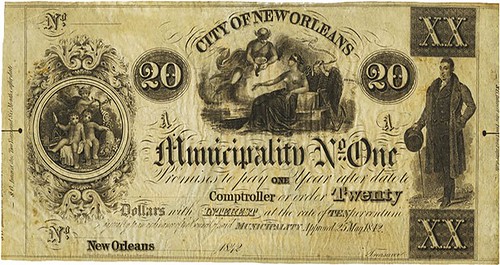
PREV ARTICLE
NEXT ARTICLE
FULL ISSUE
PREV FULL ISSUE
NEW ORLEANS MUNICIPALITY MONEY
Wendell Wolka publishes a regular Coin World column on paper money. I enjoyed the May 6, 2016 installment, which describes an
interesting time in the history of New Orleans. -Editor

Most people are familiar with the idea of twin cities, such as Minneapolis-St. Paul, Minn., and, local protests notwithstanding, Dallas-Fort Worth, Texas. I was recently working on some notes and came across an interesting one from New Orleans issued by “Municipality No. One.” Municipality No. One? Well, as it turns out, from 1836 to 1852, the City of New Orleans was split into not two, but three distinct municipalities. The reason for the split was a political response to ethnic tensions that had built up in the city, which was a melting pot of sorts during this period. In response to calls from the “American” population of New Orleans, the state legislature repealed the city’s charter in 1836 and divided the city into three so-called municipalities, each with its own council, police, schools, port, services, and so forth. These, in turn, were overseen by a mayor and general council (composed of the councils of the three municipalities). As one source observed: “The municipalities had complete control of all their local affairs, paving, improvements, etc.; they could fix taxes and issue bonds, which they did quite actively.” Municipality No. 1 took in what was referred to as the “old town” and was inhabited by primarily Creoles (native born Louisiana descendants of French or Spanish settlers) or residents of French heritage. Naturally, French was the everyday language. Municipality No. 2 was primarily settled by the English-speaking Anglo-American population. Municipality No. 3, also primarily inhabited by French-speaking citizens, tended to be the weakest of the three municipalities as it was the farthest from the urban core. The system ultimately simply proved to be too complicated and cumbersome to continue. The independent and essentially uncoordinated financial decisions made by the three municipalities, for example, undermined the city’s bond ratings. The wonder is that it lasted as long as it did until 1852 when the city was finally returned to a more traditional (and unified) form of city government. There are numerous numismatic reminders of this unwieldy form of “separate but equal” governance. Not surprisingly, in addition to commercial banks, each of the three municipalities issued various forms of currency including post notes, payable at some future date. Many are still available at affordable prices today, making putting together a four note set of Municipality One, Two, Three, and the unified city of New Orleans issues a reasonably easy challenge.
The issue of local vs regional control is an issue as old as politics itself. Every locality desires autonomy when it doesn't like
the decisions or service coming out of the regional level. But they forget the benefits of having a unified governance, and often wind up
together again anyway when the downsides of local governance come to the fore. -Editor
To read the complete article, see:
Wayne Homren, Editor The Numismatic Bibliomania Society is a non-profit organization promoting numismatic literature. See our web site at coinbooks.org. To submit items for publication in The E-Sylum, write to the Editor at this address: whomren@gmail.com To subscribe go to: https://my.binhost.com/lists/listinfo/esylum All Rights Reserved. NBS Home Page Contact the NBS webmaster 
|